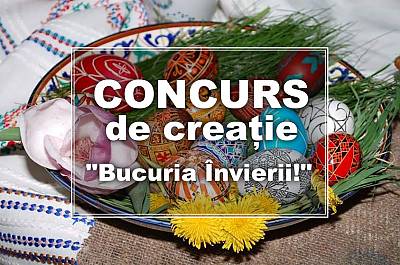The danger of the spread of COVID-19 and the measures undertaken by the public authorities, in order to prevent further infestation, have restrained the possibility of people to assemble, to perform activities or to exchange goods. An important part of our living heritage consists of performative practices, thus they cannot be properly acted. An example would be the traditional celebrations on Palm Sunday (last Sunday before Easter). During this day, in several villages, but also in cultural centres in cities, ritual performances were performed dedicated to the resurrection of St. Lazarus (in Romanian, “Lăzărelul”). It is a unique occasion, during the whole year, to sing and listen to Easter carols, which are less known, in comparison with the Christmas ones.
An important festival, of international range, was organised on this occasion in the south of Moldova - “Duminică, la Florii” (On Sunday, on Palm Sunday). The festival was a good occasion to pass on to children and youngsters the repertoire of traditional songs, dances and ritual acts. This year, it could not be held.
The Saint Week, before Easter, is rich in living traditions, such as: painting eggs, baking several kinds of ritual bread (“cozonac”, “pască” etc.), organizing ritual fires, taking care of the tombs of relatives’ and others. Because the access to public spaces (like cemeteries) is forbidden several of these traditions could not be performed. I have heard that some meet problems in finding all the ingredients for the Easter bread.
The National Museum of Ethnography and Natural History (Chișinău) organizes yearly, during this week, a workshop dedicated to painting eggs. It is a peculiar technique of painting (using bee wax) and only a few people are able to perform it. The museum is a centre were everyone can learn it from our employees who, in turn, have been instructed by folk craftsmen. For several weeks, the museum is closed for visitors.
In order to remind people about this beautiful tradition, the museum staff decided to organize a contest of painted eggs, prepared at home. We have offered the visitors of our site and Facebook page several images and links to information about painting eggs and other Easter traditions, videos from the last year workshop. We hope that especially families where this tradition lives will continue it this year and will participate in the contest, by sending us photos with painted eggs.
Les désignations employées et la présentation des textes et des documents référencés dans cette plateforme n'impliquent de la part de l'UNESCO aucune prise de position quant au statut juridique des pays, territoires, villes ou zones, ou de leurs autorités, ni quant au tracé de leurs frontières ou limites.
